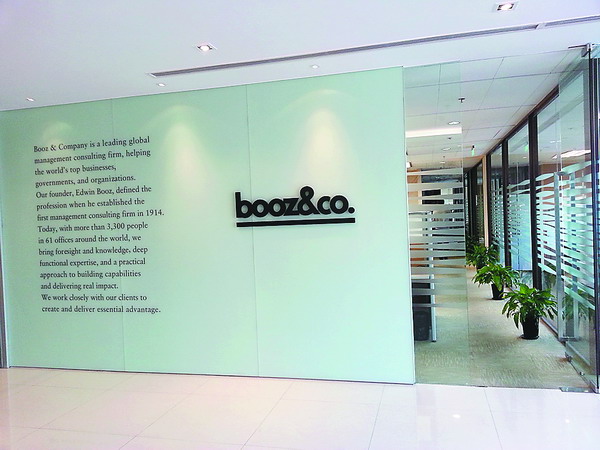Making capabilities count
Updated: 2013-01-17 14:07
By He Wei in Shanghai (China Daily)
|
||||||||
Capabilities focused
In the case of Booz, it followed this formula for success. The former combined Booz Allen Hamilton served both government and commercial clients, which required very different sets of capabilities. The government business was based on huge programs staffed by hundreds of individuals for years at a time, whereas commercial consulting relied on smaller teams focused on high-priority strategic issues delivering rapid impact.
Therefore, it made perfect sense for Booz to separate from Booz Allen Hamilton in 2008 and choose to focus on commercial business. It is further differentiating itself today as The Capabilities Firm, committed to helping its clients identify and build the distinctive capabilities they need to outperform. It acquired Katzenbach Partners in 2009 to enhance its ability to execute that strategy.
|
 The entrance to Booz & Co's Shanghai office, which is also its headquarters in China. [Photo / China Daily] |
Building on that differentiation, Booz has managed to weather perhaps the most severe economic downturn since the 1930s. When officially taking the global helm of the company in April 2012, Mainardi was proud to deliver robust financial results of 10 percent year-on-year growth.
In emerging markets such as China, revenue vastly expanded at 30 percent last year. Business in the mature US market grew at a healthy 20 percent. Even crisis-hit Europe saw a 5 percent surge last year, with some key countries expected to show greater signs of growth soon.
Mainardi is one of the principal architects of the capabilities-driven approach, which is deemed the winning formula not only for Booz but also for the many clients that turn to it for advice.
To grasp the essential advantage, as Mainardi said in a co-authored book in 2010, companies should know what to cut and what to keep.
According to Mainardi, many companies believe their only chance to beat competition is to reduce prices. They rely too much on benchmarking and imitate what others do.
However, they should really edge out rivals - not by copying them - but by applying their own well-defined set of distinctive capabilities to offer something different to the market, add new value, and break out of the pack.
He referred to the case of retail giant Walmart. "Walmart is simply amazing at sharp-penciled supply chain management. No retailer does it better. They've gotten maximum efficiency from their supply chain by integrating four capabilities - aggressive vendor management, expert point-of-sale data analytics, superior logistics and rigorous working-capital management. Together this delivers the 'everyday low prices' they are known for and allows them to lead the market. This is a winning capabilities system," Mainardi explained.
The same principle applies to other successful merchants - each leverages a distinctive set of core capabilities. Apple is good at bringing appealing, intuitive, ergonomic design to a variety of consumer markets. Zara boasts a flexible supply chain that allows it to follow fashions on a weekly basis without resorting to heavy discounts to unload inventory that is no longer in vogue.

 Li Na on Time cover, makes influential 100 list
Li Na on Time cover, makes influential 100 list
 FBI releases photos of 2 Boston bombings suspects
FBI releases photos of 2 Boston bombings suspects
 World's wackiest hairstyles
World's wackiest hairstyles
 Sandstorms strike Northwest China
Sandstorms strike Northwest China
 Never-seen photos of Madonna on display
Never-seen photos of Madonna on display
 H7N9 outbreak linked to waterfowl migration
H7N9 outbreak linked to waterfowl migration
 Dozens feared dead in Texas plant blast
Dozens feared dead in Texas plant blast
 Venezuelan court rules out manual votes counting
Venezuelan court rules out manual votes counting
Most Viewed
Editor's Picks

|

|

|

|

|

|
Today's Top News
Boston bombing suspect reported cornered on boat
7.0-magnitude quake hits Sichuan
Cross-talk artist helps to spread the word
'Green' awareness levels drop in Beijing
Palace Museum spruces up
First couple on Time's list of most influential
H7N9 flu transmission studied
Trading channels 'need to broaden'
US Weekly

|

|







